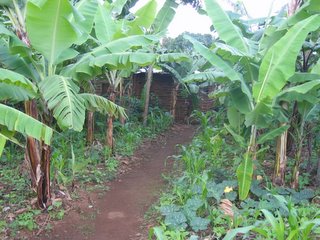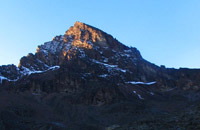
Yepp, here I am next to the tallest mountain on the African continent - 19,340 feet! It is as majestic as it appears in pictures, I tell you. My friend Thais and I decided to make the 9 hour bus trip up here from Dar between our seminars to sneak away to this beautiful place called Moshi. We're staying with another volunteer, Megan (pictured above next to me from top of Moshi hotel with fantastic view. we're a little excited..clearly), who lives here in Rombo, a village practically located in Kenya, on the backside of the mountain.

The air contains that mountain crisp, the land full of lush vegetation, and Kilimanjaro sits above, visible from all directions. The peak's been covered by clouds for the last couple days, but today, became fully revealed as we entered Moshi town. I did see some snow/glacier at the top, but they say it's gradually melting away due to global warming. So come quick all of you before it disappears!
*Some more pictures from the road trip up here taken from the bus window (impressive huh?)



We returned to the big city of Dar to participate in and observe a Girls Empowerment Conference, led by two PCVs (Peace Corps Volunteers). What a refreshing safari this has been for us, and we were able to learn and digest so much from Megan, who's a seasoned veteran with 1 year under her belt. As she's placed in a district town, she mostly organizes and facilitates teacher trainings as opposed to going into schools regularly to teach health classes herself. She finds it more sustainable to train locals to do the teaching. It's definitely made us ponder our individual approaches in our villages, although they are much smaller than her district town. Whereas she's surrounded by 16 secondary schools full of teachers to train, I have 1 secondary school, and it's an hour bike ride away. I'm not sure I would have enough people to train to fill my schedule; however the idea of training is appealing and wiser in the long run. We want our Tanzanian counterparts to continue our work after we leave. So what if I start a health club at my school if there's no one trained to sustain it once I leave? These are the questions one must ask oneself as a development worker....
Other reflections on this area--there are a lot of wazungus, or white folk. This area is saturated with development workers and "help." And as a result, I've felt a remarkable difference in the people's reactions when we approach them. They seem used to us, and less patient, even resentful. They don't seem quite as excited to welcome us, to know us as people. Perhaps too many tourists (i.e. obnoxious Americans :) have run through here. Consequently, they are bolder to ask for and expect money or "zawadi" (gifts), and even make fun of us (such as imitating our Swahili in American accents). It's quite different from my village, where people are grateful for my presence and respectful. That's at least my initial impression.
Back in the big city, I had the chance to speak with Nick Southern, the Country Director of CARE here in Dar. We had a great Ethiopian dinner together with his family and I was so excited to learn that Iringa is THE region of emphasis in development programming. All NGOs are really focusing on Iringa currently and starting new projects there. This was music to my ears because my village is in Iringa. I look forward to running into some of his staff in the coming months...
The Girls Empowerment Conference was phenomenal! I shadowed my friends, Lisa and Stef, as they led their 8 village girls to their nation's capital for the first time. Four of them came from the Christian village of Bumbuli and the other four from the Muslim vilage of Mlalo. These girls had never left their villages, and thus, took a bus for the first time, slept in a bed and showered under a real shower head, ate different ethnic foods,...so many firsts! They also had the chance to visit the University of Dar and go on a campus tour, participate in a live radio show, and most importantly, meet and discuss with "successful women" (lawyers, teachers, nurses,..). Imagine the learning and newness (eh, chacha?) that these girls experienced. I wish I could capture it...
Here they are below, creating collages about themselves to present to the entire group at the Peace Corps training center:

Speaking of capturing, after "shadowing" this week conference, I had an idea for when I implement such a project in the future. Ideally, I'd like to give each girl a disposable camera. That way, they can capture images of their own choosing - a stoplight, the speaker that most inspired them, Chinese food, streets of Dar, the ocean, each other...the possibilities are endless. Then, upon returning to the village, we could set up an art exhibit so that the girls could share their experiences with other villages. Furthermore, it would give the girls an opportunity to be the expert, teaching men, women and other youth back home about what they've learned and how they've changed. This is an idea inspired by a brilliant documentary, "Born into Brothels" filmed in India; if you haven't already seen it, you should! Any other ideas out there are welcome. This work of empowering girls continues to be the most exciting and fulfilling to me.
Take care,
Tait
Thanksgiving at the US Ambassador's house was nice-can you believe this view from his top deck? (with my friend Kate, overlooking Indian Ocean in Oyster Bay):




3 comments:
Hi Tait,
Karibu Tanzania! I've lived in the Makambako area off and on for years. If you ever find yourself in Malangali, you're in my stomping grounds.
Your photo idea is great - I've done something similar, handing people my good-quality point-and-shoot 35mm camera and asking them to go shoot a role of film. The film is easy to have processed in Iringa (and I think even Makambako these days!), and you can get the duplicates to the photographers very quickly. You probably want to do a brief tutorial in photo composition and lighting before handing out cameras, or you'll get a lot of shots with cut off body parts, masses of sky, and indistinguishable people against bright skies. I've found that teenagers learn the basics very quickly, especially if they are going to bear some of the cost of the film or developing.
When I'm in the US I often go around to tag sales and buy used point-and-shoots, and then give them to Tanzanians friends as gifts. There are plenty of cameras available in the US for $5 or less these days, because so many people are moving over to digital. If you can get your friends and family to scout out cameras for you, you can probably fairly quickly have a bunch of cameras on hand that will give much better quality than disposables, at even less cost, and that you can leave with people as gifts when you leave. Cameras aren't just nice presents - people will use them as income sources, charging 400 shillings per picture and earning school fees, food, etc.
Best of luck with the project! If you get some good pictures, either digital or scannable, please make sure to submit them to the Internet Living Swahili Dictionary at http://research.yale.edu/swahili/serve_pages/photo_uploader_en.php - your photo project can then live on helping people learn Swahili for years to come! Also, please tell your Peace Corps colleagues about the project - every picture helps!
Cheers,
Martin Benjamin
Ooops - got the URL for the Photo Uploader slightly wrong. The address with all the explanations is here:
http://research.yale.edu/swahili/serve_pages/photouploader_en.php
Cheers,
MB
Hey there! I have to admit, you seem to have a very well put together blog here!
Regards,
Disposable Bat Mitzvah Camera
Post a Comment